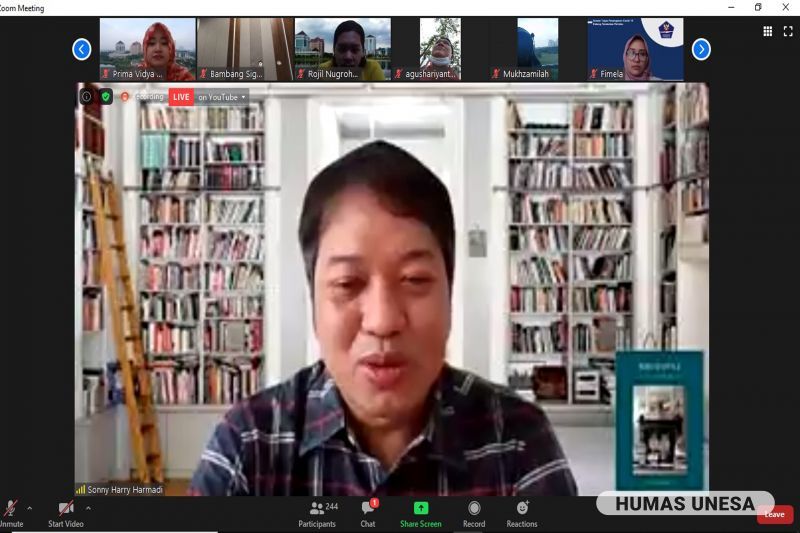
www.unesa.ac.id
Unesa.ac.id, Surabaya – The Covid-19 pandemic has forced people to be more sensitive to health and change their behavior according to health regulations. Socialization is one of the important steps to enlighten the public regarding the covid-19 virus. State University of Surabaya is working with the behavior change Task Force under the coordination of the National Disaster Agency.
Training for ambassadors for the behavior change movement attended by more than 200 students on Sunday (22/11) through Zoom and live youtube. In this event, Prof. Dr. Nurhasan, M.Kes. (Unesa Chancellor), Prof. Dr. Bambang Yulianto, M.Pd. (Vice Rector for Academic Affairs), Dr. Agus Hariyanto, M.Kes. (Deputy Chancellor for Student and Alumni Affairs), Sonny Harry B Harmadi (Head of behavior change) and two presenters, namely Fimela Apriany and Rama Gusti Anuga.
"We have prepared more than 6,000 students who will assist in cutting this covid-19," explained the Rector of Unesa. In his remarks, Prof. Dr. Nurhasan, M.Kes. Hasan also said that there needs to be self-awareness to be more responsive to what is happening at the moment, such as maintaining distance, avoiding crowds, wearing masks and maintaining health. Higher education is also expected to be at the forefront of providing understanding to the community about the current pandemic.
"Indonesia currently needs a helping hand and commitment from all of us, our concern is also needed for changing behavior with 3M (Putting on a mask, washing hands, keeping distance and avoid crowds" he added.
Cak Hasan also said that Unesa was very responsive in dealing with this pandemic, this was evidenced by the rapid handling carried out by Unesa when 15 Unesa students were trapped in Wuhan, early 2020.
This year, through the Covid-19 Student Community Service program volunteer which was carried out simultaneously from Sabang to Merauke, through Unesa students. They will intensively educate the community to always apply the health protocol recommended by the government.
Sonny Harry B. Harmadi explained that during this pandemic, there were many things that we could learn. The government, together with the Covid-19 task force, changed from what was originally a public health emergency to becoming public health resilience. "Where the resilience of this community puts behavior change as the key on handling Covid-19," he concluded.
In this training event, students will get a lot of information about the provision of behavior change ambassadors delivered by Fimela Apriany. He conveyed how to conduct socialization, procedures that must be done and various other things. The students will carry out this socialization during the Student Community Service program period. In addition, on their way forward, students who become ambassadors for behavior change will also be equipped with an application to report their socialization and the responses they receive. Students are prioritized to conduct socialization around the neighborhood where they live, to make it more efficient and effective.
Rama Gusti Anuga provides an explanation to students about how to use the application for reporting the socialization. Starting from logging in to the explanation of each sub-menu. Besides that, students are also given the opportunity to ask questions to understand the application concept in detail.
Through this program, students can contribute greatly in providing education through socialization to the community in their neighborhood. "One student has a wide impact if they can change just one person. So, this can have an impact on one family, one community and even other families, so that there will be a collective change," concluded Cak Hasan. (Hasna)
Share It On:






